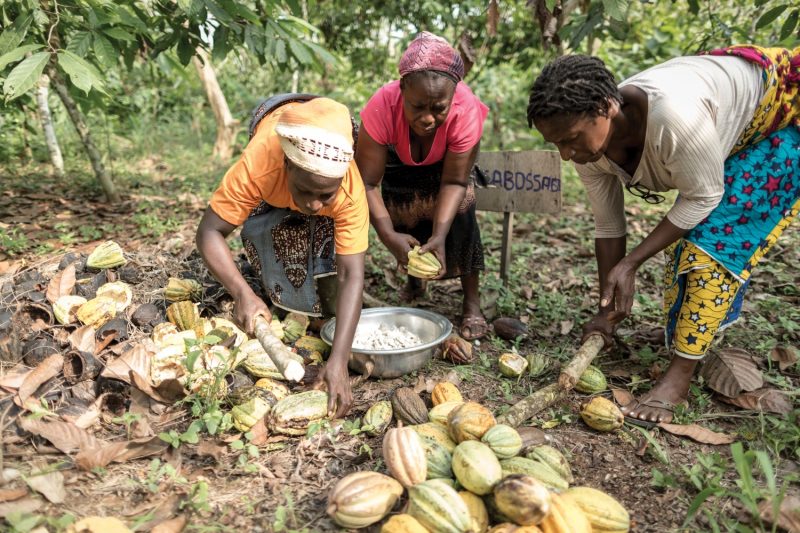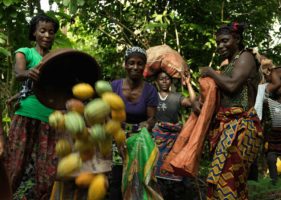Fairtrade calls on UK government for action on ‘hidden’ carbon emissions in food supply chains, including cocoa

Fairtrade - Cotes d'Ivoire Cacao
The Fairtrade Foundation has issued a plea to the UK government to actively tackle ‘hidden’ carbon emissions in British food supply chains – including cocoa growing markets, in an urgent bid to address global climate change, reports Neill Barston.
As the charity highlighted in its latest report marking the start of Fairtrade Fortnight this week, by 2050, conditions in key producing nations including Ghana and Ivory Coast may become too hot for cocoa growing as a direct result of changing weather patterns impacted by deforestation linked to agriculture and industrial activity.
According to Fairtrade, present efforts from government have fallen short of requirements to protect small-scale farmers on the frontline of the climate crisis in low-income countries, with many of those working within agriculture earning wages less than UN defined poverty levels.
In the case of Ivory Coast, the country has reportedly lost around 80% of its forest areas since the 1960s due to commercial activities – with cocoa growing serving the confectionery sector high among that list, which comes as campaign group Mighty Earth produces a study that revealed a study reportedly claiming 47,000 hectares of deforestation in Ivory Coast alone within the past year, mapped by satellite data, representing an area four times as large as the city of Paris.
The latest report from Fairtrade, titled A climate of crisis: farmers, our food and the fight for justice, warns that global heating is causing irreparable harm to agricultural communities overseas and could also seriously hinder the UK’s food supplies in the coming decades. It urges the government and private sector to ‘take stronger, faster action’ to drive down emissions in agricultural supply chains, to support farmers and safeguard the future of imported favourites such as cocoa, coffee and bananas that are at risk from changes in climatic conditions.
In response, last November, the UK government unveiled plans for an Environment Bill, championed by International Environment Minister Lord Goldsmith, which aimed to ban companies from selling products with a connection to companies selling products with a link to deforestation overseas. However, industry observers have raised concerns that without such a framework being enshrined into global law, then it may not achieve its goals if it lacks legal enforcement capability.
Fairtrade Foundation’s report highlights the problem of the UK’s ‘hidden’ carbon footprint: the greenhouse gas emissions generated overseas (including in poorer, climate-vulnerable nations) to create food and produce to meet UK demand. Figures show that nearly half (46%) of emissions linked to UK consumption are in fact created overseas, while 54% is domestically produced.

As the organisation noted, the UK’s hidden carbon footprint were a country, it would rank higher than over 170 other nations in the global tally of biggest emitters, and it is several times higher than the total footprint of many low-income countries who supply the UK’s food, Fairtrade Foundation has calculated. Nevertheless, the UK’s climate targets only address its domestic footprint, not offshore emissions. The Fairtrade Foundation is now urging the UK to ‘stop dumping our emissions’ on poorer nations and take responsibility for its ‘true carbon footprint’, by including offshore emissions in its net zero target.
Path to zero emissions
Fairtrade Foundation CEO Mike Gidney said: ‘Although the UK is on a welcome path to net zero emissions, if we don’t own up to our hidden emissions, our climate policy will never fully succeed in driving down our true footprint, and we will fail the small-scale producers overseas who grow the food we Brits love to consume. Fairtrade Foundation believes these invisible emissions are, ultimately, the UK’s responsibility: they take a heavy toll on the farmers who keep our shelves stocked and fridges full, and who are disproportionately affected by climate change.
‘Not only is the climate emergency threatening the livelihoods of farmers in low-income nations, it’s also jeopardising the future viability of their crops, meaning supermarket staples like chocolate and coffee could conceivably become luxury items by 2050 if global heating continues apace. We must stop outsourcing the burden of responsibility for tackling UK-driven emissions to other countries, including much poorer ones who have done the least to cause climate change.’
The Fairtrade Foundation wants the UK government to include international aviation and shipping in its carbon budgets and set out a clear policy to reduce these emissions, as recommended by the UK’s Climate Change Committee. ‘We believe this would be a powerful way for the UK to take ownership of this issue and it would also show strong leadership to other nations as we prepare to host COP26 in Glasgow later this year,’ said Mr Gidney.
He continued: ‘Richer nations like ours have a historic responsibility for emissions, but farming communities across Asia, Africa and Latin America bear the brunt of the crisis, at a time when they continue to suffer the economic impacts of the Covid-19 pandemic. Alone, they don’t have the resources to withstand climate impacts such as the more frequent and stronger droughts, floods and storms that ruin crops and ruin lives.
‘All this seriously undermines farming communities’ efforts to escape poverty – especially if the climate adaptation funding for producer countries remains inadequate – and closer to home, it has serious consequences for our own food security. That’s why, this Fairtrade Fortnight, we are calling for climate justice for farmers.’
Consequently, Fairtrade Foundation has called on the government and UK businesses to ensure farmers overseas have the funds to adapt to the climate reality – including by ensuring they receive higher, fairer prices for their produce.
The organisation’s CEO added: ‘Given that nearly half of the UK’s food comes from overseas; with up to 10-15% from Asia, Africa and South America, we all have a stake in ensuring future generations of farmers who produce our food can do so in climate-friendly ways, while earning enough to stay in business and live the sort of life their hard work deserves. This matters for all of us.
‘It’s a scandal that millions of farmers still earn too little for their food crops. We can’t expect them to tackle the climate emergency if we won’t ensure they earn a decent income: that’s why Fairtrade continues fighting for living incomes. Without fair prices and fairer trading practices, chronically underpaid farmers will continue to struggle to pay for essentials like food and healthcare, let alone protect their crops from climate damage. They need comprehensive financial support: it should not fall to them to deal with a crisis not of their making.’
The Foundation will continue working with farmers, businesses, policy makers and consumers to make trade greener and more sustainable. This Fairtrade Fortnight, it is launching the virtual Choose the World You Want Festival, to inform and inspire people around how best to support climate justice for farmers and workers overseas.



